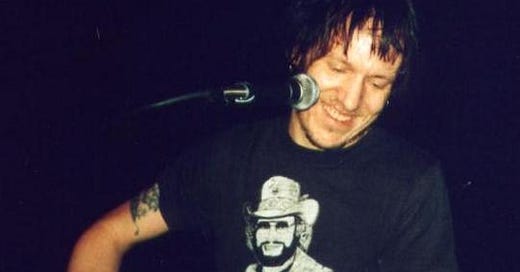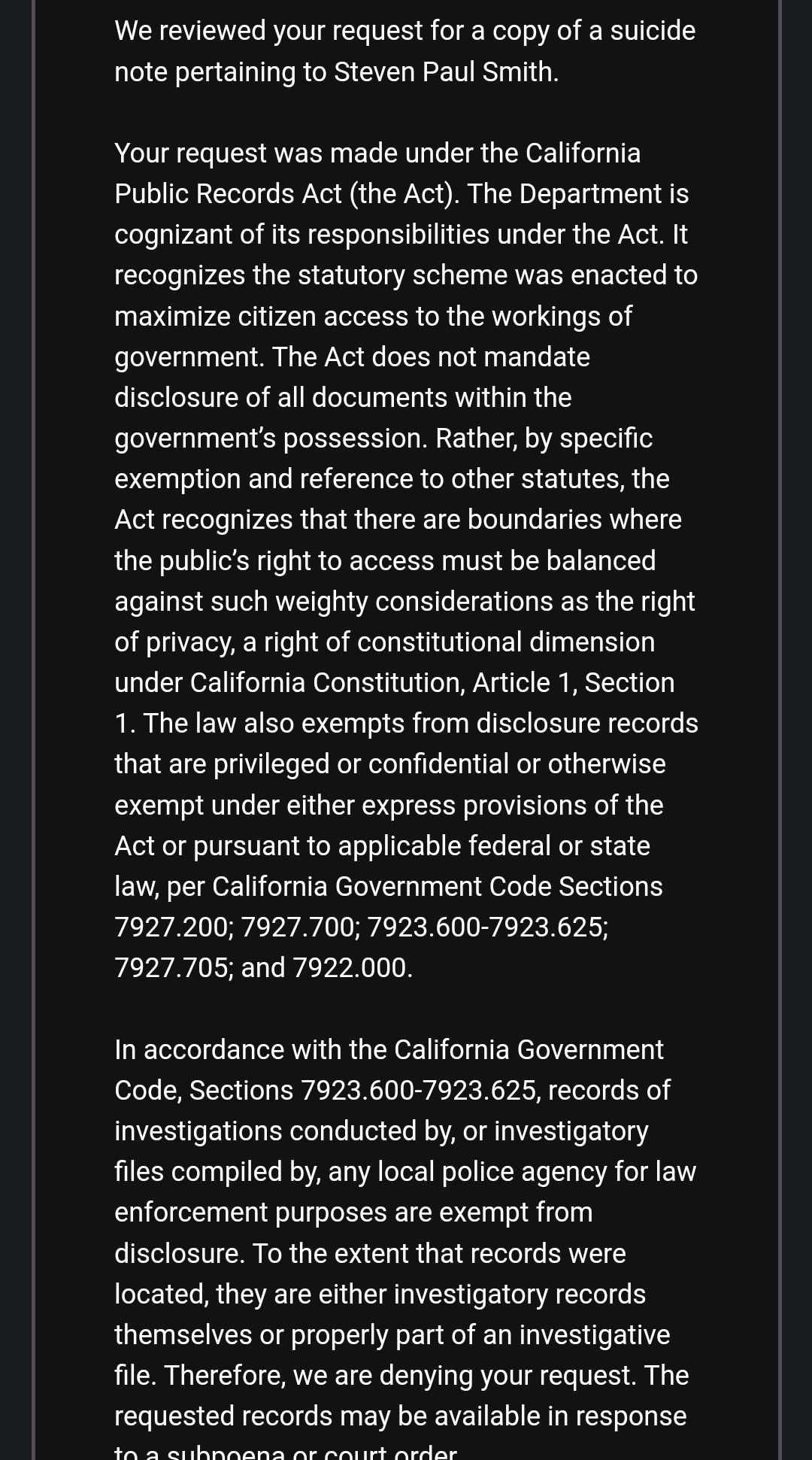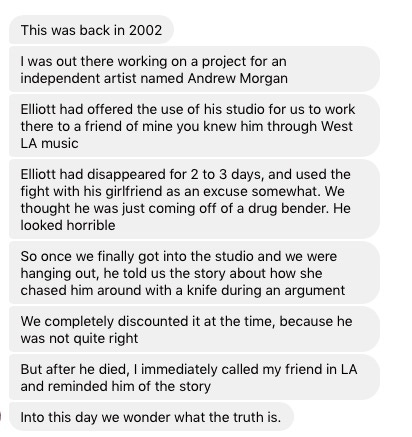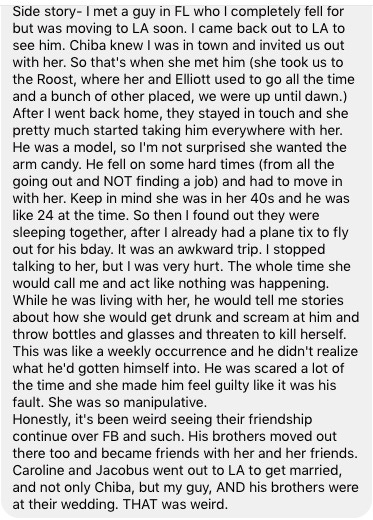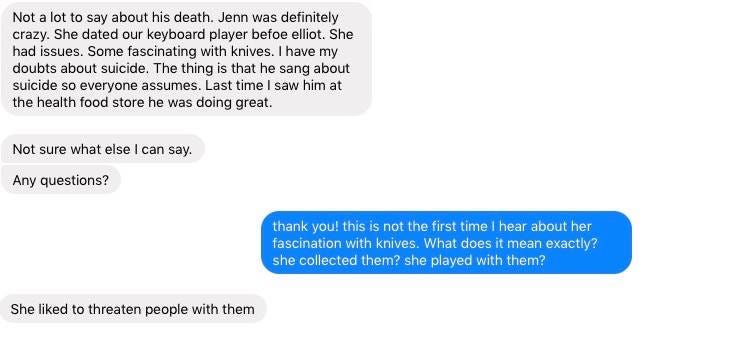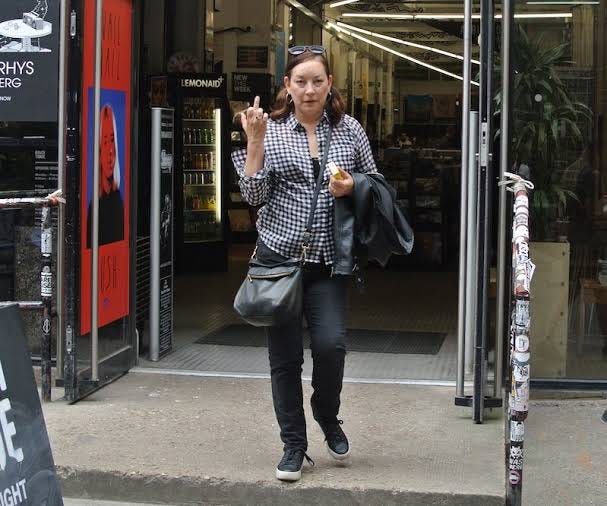Miss Misery: The Death of Elliott Smith
October marks the 20th anniversary of the beloved indie musician's death
Steven Paul Smith, better known as Elliott Smith, was born August 6, 1969 in Omaha, Nebraska. Elliott was a singer-songwriter and singular talent, and even since before his death, Smith has been regarded as a musical prodigy, and one of the most influential modern artists in guitar music.
Although he was born in Omaha, Nebraska, Elliot was raised primarily in Texas until he moved to his father’s house in Portland, Oregon as a teenager. He attended college at Hampshire College in Amherst, Mass, and aside from this, spent most of his adult life in Portland.
A multi instrumentalist best known as a guitarist and singer, Elliott was a talented studio musician who also played the piano, clarinet, bass guitar, drums, and harmonica. He self recorded his debut album Roman Candle on two four track tape machines in his girlfriends house.
He is best known for his songs "Miss Misery", from the Good Will Hunting soundtrack, which was nominated for the 1998 Academy Award for Best Original Song, and "Needle in the Hay", which appeared in Wes Anderson's 2001 film The Royal Tenenbaums, in a scene featuring a suicide attempt. He was reportedly upset about the context in which the song was used.
It has been speculated that his pseudonym came from Elliott Avenue, a street that he lived on in Portland; an acquaintance from junior high school claims he adopted this name so as not to be confused with Steve Smith, the drummer from Journey.
At the time of his death, Smith was working on his sixth studio album, From a Basement on the Hill, which was posthumously produced and released in 2004.
Smith had been a heavy substance abuser, and his struggles with drugs, alcohol, and mental illness were clear from his lyrics, but he was sober on October 21, 2003, when he died in Los Angeles, California, from two stab wounds to the chest at the age of 34.
He was at his home in Echo Park, California, where he lived with his girlfriend, Jennifer Chiba when he died. According to Chiba, the two were arguing when she locked herself in the bathroom for a shower.
Chiba claims she heard Elliott scream and opened the bathroom door to the sight of him standing in the living room with a knife sticking out of his chest. She told police that she pulled the knife out, after which he collapsed. She called 911 at 12:18 pm. Despite emergency surgery, he was pronounced dead 20 minutes after arriving at hospital. The time of death listed as 1:36 p.m. He was just 34 years old.
A note provided to police by Chiba, written on a sticky note, read, "I'm so sorry—love, Elliott. God forgive me."
Chiba reportedly told friends that less than an hour before his death Smith had threatened to kill himself. Smith's death was widely assumed to be a suicide, but the autopsy could not determine cause of death with any certainty.
There were possible defensive wounds, which were inconclusive but are considered typical when someone is attacked by another party, and there were no hesitation wounds, which are typically found in self inflicted stabbings.
Reports that his name was misspelled on the note are false; the coroner misspelled his name. The coroner also reported no trace of alcohol or other recreational substances but did find antidepressants, anxiety medication, and ADHD meds at doses consistent with his prescriptions from his doctor.
From the coroners report:
"The mode of death is undetermined at this time. While his history of depression is compatible with suicide, and the location and direction of the stab wounds are consistent with self-infliction, several aspects of the circumstances (as are known at this time) are atypical of suicide and raise the possibility of homicide.
These include the absence of hesitation wounds, stabbing through clothing, and the presence of small incised wounds on the right arm and left hand (possible defensive wounds). Additionally, the girlfriend's reported removal of the knife and subsequent refusal to speak with detectives are all of concern.
Since a complete knowledge of the circumstances surrounding the stabbing is lacking, the mode will remain undetermined until such time as sufficient additional information becomes available."
The Los Angeles Police Department's investigation remains open, and they will not release any of the information they have collected. They denied our very narrow request for a copy of the suicide note allegedly written by Elliott in 2003.
Larry Crane wrote on the Tape Op message board (a forum for recording engineers and recording enthusiasts) that he was supposed to help Elliott mix the album that would become From a Basement on the Hill.
Crane wrote, "I hadn't talked to Elliott in over a year. His girlfriend, Jennifer, called me… and asked if I'd like to come to L.A. and help mix… I said 'yes, of course', and chatted with Elliott for the first time in ages. It seems surreal that he would call me to finish an album and then a week later kill himself. I talked to Jennifer this morning, who was obviously shattered and in tears, and she said, 'I don't understand, he was so healthy.'"
Rumours abound in reference to his death. Alyson Camus, a journalist and fellow musician, has researched Elliott’s death extensively, collecting her work in a book titled A Question Mark: An Investigation into the Mysterious Death of Elliott, as well as a blog titled Justice for Elliott.
Highlights of her work include the following excerpts from conversations with 4 individuals with personal knowledge of the couple which describe a pattern of domestic violence and abuse from Chiba:
In an article published online in 2004, Chiba said she had become a suspect in the court of public opinion. She continued:
“Up until now I’ve chosen to remain silent because I want to maintain some sense of privacy for Elliott and his family and myself in this really difficult time. But I want people to know that I’m not keeping quiet because I have anything to hide. If I was a suspect, I would have heard from the investigators, for one thing. Another is that his sister and his parents and everyone close to him knows the truth, so I’m not worried about it.”
She also specifically objected to accusations of her “refusal to speak with detectives,” saying “The media are just looking for some sort of sensationalistic angle that will sell their publications. In my mind, there’s no question to what happened and there’s no need to put that kind of spin on it”.
Chiba is now a family therapist in California.
We had hoped to interview Alyson Camus for an episode of Murder Talk Radio but sadly, scheduling conflicts meant that didn’t happen. We were able to interview her by email, and we hope to have her on as a guest in the future to discuss her book and the death of Elliott Smith. Here is the interview by email, lightly edited for read-ability.
So, I know you prefer to stay anonymous, but can you tell us a little bit about your background?
Alyson Camus: I am a fan, I saw Elliott many times in concert and was in shock when he died. I was supposed to see him again in November as he was on the bill for the festival All Tomorrow Parties in Long Beach. He died just a few weeks before and Iggy Pop, who was headlining, dedicated a song to him. I work in a school and I prefer to use a pseudonym for this reason...
What led you to write a book about the death of Elliott Smith? What made you decide to write it in the first person? Big Hunter Thompson fan?
Alyson Camus: For a long time, I thought it was not my place to do this, but I have accumulated so much information that I decided to write about everything I knew. The third person? yeah, I don't know if it was the right choice (some people like it, and others hate it) but it was either "Alyson" or "I". I wanted a link between all the characters/people I have met. Alyson is a pseudonym but in the end, it doesn't matter because I really talked to all these people.
My husband always jokes that all songs are sad songs. You wrote that Elliott wrote happiness and sadness into all of his songs. Can you elaborate on what you meant?
Alyson Camus: He said in interviews that his songs are impressionistic and are not on one tone but rather include many different touches. To feel sad you have to feel happy.
A lot of the people you spoke to seem to desire anonymity. What do you think motivated that? Did many of them say?
Alyson Camus: It's a bit of a mystery to me. Very few people want to speak on the record and I am not sure why. Because of Chiba's litigious nature? (She threatened a few people with lawsuits). Most of them said they were not there, so I guess they don't want to be accusing someone of murder without evidence, Others are still friendly with Chiba and others don't care enough.
In the book, you mention that Kaitlyn, the forensic behavioral psychologist you talked to, said that it was possible the method was Elliott’s attempt to hurt Jennifer Chiba. Did she talk about how likely or unlikely that was? What did she say about it?
Alyson Camus: She said that to kill oneself in such a manner in front of someone you purportedly care about is a very passive-aggressive act: although the act itself is self-harming, the clear intention is to inflict maximum psychological damage on the witness. If he DID kill himself, Elliott did it intending to hurt Chiba--either psychologically, or with the understanding that such an odd event would cast suspicion on her.
And you also spoke to, I believe a medical examiner, who actually co-authored a paper in Forensic Science International titled “Homicidal and suicidal sharp force Injuries: Autopsy Parameters in Relation to the Cause of Death”? What were his insights?
Alyson Camus: Yes, and [he] was nice enough to review the autopsy report. He said that the following findings were more in favor of homicide:
- Sharp wound in the thorax associated with underlying bone injury. (sternum)
- Clothing defects in the chest area where are located the two lethal sharp force wounds.
- Absence of hesitation wounds in the vicinity of the two lethal thoracic injuries.
- Two incised wounds on the right arm and left hand, raising the possibility of defensive wounds.
- The axis of the two lethal wounds is near the vertical.
Other elements may point to suicide:
- All the sharp wounds found may be self-inflicted.
- No clothing defect in front of the incised wound of the right arm (but this last point became invalid when he learned that Elliott was wearing a short sleeve shirt)
So that's a lot of findings in favor of homicide.
Did you look into any other studies on the subject of self-inflicted knife wounds in suicide? What did you find?
Alyson Camus: I read many studies, and I have included all the references at the end of the book. I probably have downloaded more than 100 scientific studies on the subject and they all point to the same conclusion: all the findings listed above (sternum injury, absence of hesitation wounds, clothing defects in the chest area...) are statistically rare in case of suicide and the combination of all of them makes of this case a statistical oddity.
Elliott was sober when he died, excluding his prescribed psychiatric medications, is that correct?
Alyson Camus: Yes, it's correct. The toxicology report is available. He didn’t have any pain killer in his system by the way.
Jennifer Chiba and Elliott were fighting right before she died, she said it was about a doctor’s appointment? A therapy appointment? Her description seemed kind of subdued. Their neighbors heard them fighting?
Alyson Camus: Several stories were circulating at the beginning, but she finally said Elliott was supposed to drive her to a doctor’s appointment and they were arguing about this. The fight was very loud and violent, the neighbors heard them and said they had been fighting for hours. They were used to it as this was happening “daily” according to a neighbor. She had a DUI by the way, so she couldn’t drive. One thing is certain, nobody is going to commit suicide over such a trivial argument, so something else happened…
She’s a therapist, is that right? What kind?
Alyson Camus: Yes, she has been a marriage and family therapist since 1995 (written on her official license). She has also said she is an art therapist, From what I know, she has worked in different facilities and treated troubled children/teenagers, I even talked with one of her ex-patients.
You’ve mentioned she also had a history with knives. She and Elliot supposedly stayed up sharpening some the same week he died, and you also wrote about stories of her being violent towards people with knives.
Alyson Camus: The story about them sharpening knives comes from W. T. Schultz’s book, Torment Saint. I have always found him mentioning this detail very strange, especially because he believes that Elliott committed suicide.
On the other hand, I heard several people calling Chiba “a knife freak” and she allegedly threatened another ex with a knife. This ex has always refused to confirm anything. There is also another story: according to a recording engineer, Elliott said she chased him with a knife in their apartment several months before his death.
And she supposedly did CPR after she pulled the knife out of his chest?
Alyson Camus: This is what she said, which doesn’t make sense since she has already removed the knife and Elliott had two deep open wounds in the chest. CPR increased his blood loss.
Why hasn’t the LAPD closed the case? It must have been frustrating trying to get investigation materials 10 and 20 years after the fact and being turned down pending investigation. Did they do any work on it at all?
Alyson Camus: The LAPD cannot close the case because the autopsy is not conclusive. It is very frustrating, and they never revealed anything. I know that the family tried to get information but was turned down too.
What’s the deal with the cliff?
Alyson Camus: It’s often misinterpreted as a suicide attempt, but when you look at the circumstances it cannot be one. It was just a stupid accident: Elliott was upset and drunk, it was very dark, and he ran away without even knowing there was a cliff. One of his friends followed him and fell too.
Chiba told someone that Elliot wanted to leave her. And the same person said Chiba waited maybe 20 minutes before she called 911. Where was that information from?
Alyson Camus: Different people told me he wanted to leave her, including someone who had dinner with them 1 or 2 days before his death. A family member told me the same thing and Chiba told this family member that there was a delay in the arrival of the ambulance because her cell phone was not working. Which is stupid because they had a landline and many neighbors.
Sean Organ, who runs Org Records, he had some interesting comments about their relationship, and he was one of the few who spoke on the record. What did he tell you?
Alyson Camus: I never spoke to him. He made this declaration back in 2004 and then refused to say more to anyone.
Autumn de Wilde had a great quote in the book. What did she say about Elliott’s death?
Alyson Camus: I think it’s a quote from an NME article. She said the circumstances around his death never sat well with her at all. However, there was only one person there so we will never know
His friend from college, too, Serena Williams. What did she share with you?
Alyson Camus: Yes, and Serena met Chiba, whereas many other people never met her. Serena noticed Chiba’s impatient/jealous/angry behavior and she is very suspicious of what happened for all these reasons. She attended one of Elliott’s last concerts and observed how controlling Chiba was.
How about you, what were your takeaways from your research and investigation?
Alyson Camus: Well, I cannot be certain of anything, but I am very suspicious of Chiba’s narrative for a ton of reasons. She was much more involved in his death than she is ready to admit, she is at least responsible for his massive blood loss because she removed the knife and didn’t call 911 immediately. But she might have done more than this.
What was your goal when you wrote A Question Mark? (Justice for Elliott) Do you think you've gotten closer? Is there anything Elliott Smith fans can do to help get justice for Elliott?
Alyson Camus: I just wanted to inform people. Plenty of them don’t even know the investigation is still open and assume it was suicide based on his art (which is the worst thing that could happen to an artist). I am big on the separation between the art and the artist and his songs were not autobiographical, his art is much more subtle than this. I don’t think I can prove anything with certitude unless a big revelation/confession comes up, but I can at least try to get closer to the truth.


